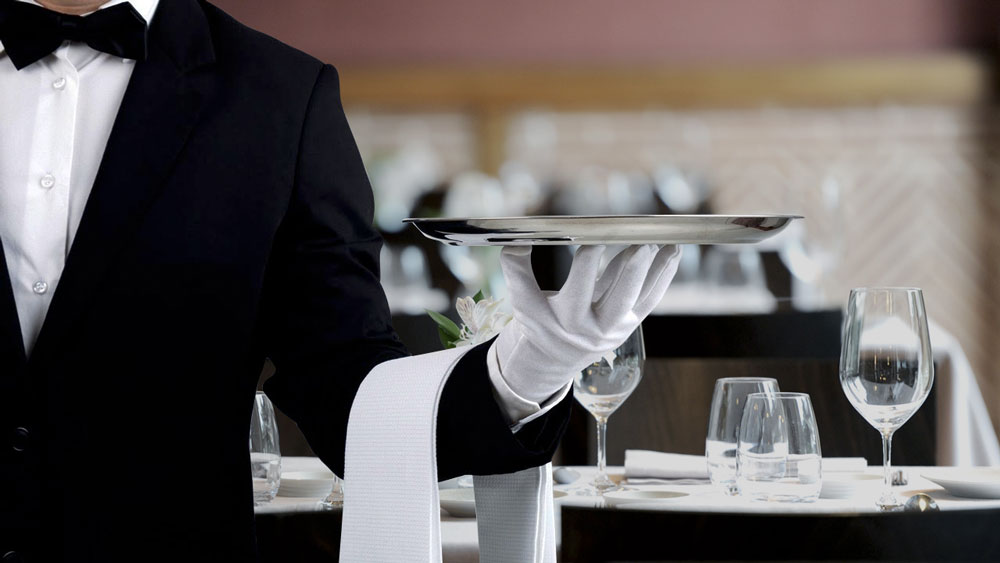 I have many questions and an overwhelming desire to research and look more deeply into this issue of the care and services provided by waiters.
I have many questions and an overwhelming desire to research and look more deeply into this issue of the care and services provided by waiters.
There are a number of rules, included in what we usually call “Protocol”. This series of “rules of behaviour” is something that every waiter or expert in the hotel and catering industry must know and practice. Nowadays, what we call “Protocol” in the catering service has evolved over the last years and there are many things to take into consideration.
The first thing I want to point out to Spanish speakers, of whom there are many, is that we must keep the word camarero/a (waiter) and Jefe de Sala (head of the dining room). The French word maître is fine but should I tell you that the meaning of camarero/a has a longer ancestry and comes from an illustrious lineage, things change and the word camarero is given its fair value.
 In olden times, the camarero was a very distinguished servant in the house of the Grandees, who was at the service of the king, the queen, the Pope, of a nobleman or another member of his chamber, he was in charge of everything that belonged to said chamber. In the royal house of Castile, the head of the king’s chamber was called, the Camarero of the King, which would now be a head of room.
In olden times, the camarero was a very distinguished servant in the house of the Grandees, who was at the service of the king, the queen, the Pope, of a nobleman or another member of his chamber, he was in charge of everything that belonged to said chamber. In the royal house of Castile, the head of the king’s chamber was called, the Camarero of the King, which would now be a head of room.
As for the camareras, these were the ladies with the highest authority amongst those who served the queen, and who had to be belong to the Spanish nobility have been great in Spain and among many other powers had the authority to command all those who served in the palace.
Spanish is a rich and historic language that we must defend against so many Anglicisms. Let’s use the word camarero or jefe de sala with pride and banish the word maître which simply means: master of the room, specialized in restaurants or hotels.
Is there anyone who still wants to be a waiter for vocation? Those waiters who remember the name of their faithful customers and their preferences, who ensure that everything as it always has been, who treat all with respect but also with cordiality. My God, how I miss that!!
These men created a school even though they were self-taught, but they possessed a very important ingredient, they were proud of their profession because they understood very well that being obliging:
(according to the RAE – Which serves with care, diligence and gift. Soon to please and serve others), is not to the same as being servile:
(according to the RAE – belonging to or relating to servants and servants. That in a lowly way submits totally to someone’s authority).
As the great cocktail bartender Javier de las Muelas, says, “To serve is to love and a way of understanding life”.
 As for the qualities that waiters must have, they are many. Sometimes they witness and hear things which mean they must be psychologists and at the same time the most discreet people in the world. They need to have a lot of emotional intelligence.
As for the qualities that waiters must have, they are many. Sometimes they witness and hear things which mean they must be psychologists and at the same time the most discreet people in the world. They need to have a lot of emotional intelligence.
In my opinion, there are three main areas that the bartender must control. Firstly, the attitude: “Kindness, generosity, humility”… Secondly, product knowledge and professionalism. And most importantly, the feeling: “Passion and psychology to know how to treat the customer”.
The kings of the dining room that we should all know and never forget, are now the Maestros of a new generation of waiters who have the task of not forgetting the maestro’s teachings and at the same time give a new twist to the dining room without losing the fundamental values of customer service and new rules of protocol that call for freshness and modernity.
As Maestro Mariano Castellanos, Honorary President of AMYCE, so rightly says, “Our profession belongs to the culture of detail”.
“However, today there are many hotel schools that did not exist before; the first in Spain dates back 52 years, in Madrid at the Casa de Campo. But when we talk about service and more specifically hospitality, it is something more than just having a study base, you need to have psychology, a concept of service and customer care and that is acquired over time. When I started in this, 45 years ago, I did so with great enthusiasm in a village bar, but when I moved to the Meliá chain, I could see that the waiters working there were professionals, they were teachers, the Maîtres transmitted everything they knew.  There were always masters and apprentices. Today it seems that transmitting what you know is like saying that they might take your job away. No! What is more beautiful than teaching everything you know, and others wanting to receive your knowledge? Because there’s always something that people don’t know, or don’t want to know. When you teach, you are learning at the same time, something you teach will always stay with you, and will never be forgotten. Because it’s one thing to keep it in mind, and another thing to develop it”.
There were always masters and apprentices. Today it seems that transmitting what you know is like saying that they might take your job away. No! What is more beautiful than teaching everything you know, and others wanting to receive your knowledge? Because there’s always something that people don’t know, or don’t want to know. When you teach, you are learning at the same time, something you teach will always stay with you, and will never be forgotten. Because it’s one thing to keep it in mind, and another thing to develop it”.
Another great of the dining room is Carmelo Perez. He has been the restaurant manager at the Ritz Hotel, the Palace, Club 31 in Marbella, Jockey and Zalacaín, just some of the prestigious places where he has worked. “Humility, dedication, discretion and even psychology are some of the main qualities of a good waiter. And if you have the memory to learn the tastes of the clients and remember their names, all the better”.
To sum up, “A good waiter must sell happiness”.
Lately I have come across this awful phrase, “Spain is a country of waiters”, which has become a mantra for many intellectuals in our country. I admit that I hate the phrase. I think it is unfortunate and does a disservice to our professionals and to the tourism industry, on which, by the way, many families depend on for their livelihood in Spain, and that is a great honour. It is a privilege to be a country everyone wants to visit!
 So that I’m not accused of cleaning my own back yard, Alexander Gilmour recently began an article in the Financial Times with an interesting sentence: “Waiters are the windows through which we see the soul of cities. In San Sebastian, he continues, “they radiate charm and optimism, and since I didn’t know anyone else, I assumed that in that city everyone is a charming person.
So that I’m not accused of cleaning my own back yard, Alexander Gilmour recently began an article in the Financial Times with an interesting sentence: “Waiters are the windows through which we see the soul of cities. In San Sebastian, he continues, “they radiate charm and optimism, and since I didn’t know anyone else, I assumed that in that city everyone is a charming person.
The waiter thus becomes an “ambassador” of the country where he works and it lies in his hands, through being competent, clean and attentive, to make the best impression on tourists. In that same newspaper, the Spanish correspondent, Tobias Buck, marvelled a couple of years ago, shortly after arriving in the capital, at the capacity, skill and memory of the Madrid bartenders (I still marvel) who were able to serve many varying orders either at the bar or at the coffee table, ranging from a small cup with warm milk and a dash of coffee, American coffee, decaffeinated in a glass with cold milk, all of course without any mistakes and to be able to give the bill, together or separately shortly after it has been asked for.
For many tourists, and especially for those who travel with an all-inclusive tour operator, it is essential to establish a good relationship with the waiter who will be serving them during their stay, often the only Spaniard they will meet during their holidays (assuming the waiter is Spanish). He or she will help you navigate the unknown world of wines, local products and the menus in the hotels and restaurants and can make your vacation a success or a failure.
This disdain for the “country of waiters” comes from the fact that, in general, it is a job that is poorly paid with respect to the effort required, the working hours are abnormal, there is a high level of precariousness and very low levels of unionization. Some measures, such as including the service on the bill, American style, could help to reduce tax fraud and improve working conditions which would help many to be proud of living in a country of waiters.
 “Not everyone is good at this,” says Abel Valverde, head waiter at Santceloni, a two-star Michelin restaurant: “There must be a vocation, it’s a visceral job. You have to be able to cope with your personal situation on top of your work situation. If you are having a bad day, you have to act a part; and not everyone is a good actor,” he says. Valverde stresses that the problems of temporariness and intrusiveness are factors that debase the profession: “It’s inconceivable that you would hire people who aren’t trained, this is something that doesn’t happen in other professions. Valverde explains that waiters can’t be “mere plate-carriers”: “Connecting with the customer is very important, as is psychology and being able to adapt to each situation, and that requires training”. Valverde reminds us how highly valued a professional trained in Spain is outside the country and calls for the dignity of the profession: “We need role models, just as we do in the kitchen”.
“Not everyone is good at this,” says Abel Valverde, head waiter at Santceloni, a two-star Michelin restaurant: “There must be a vocation, it’s a visceral job. You have to be able to cope with your personal situation on top of your work situation. If you are having a bad day, you have to act a part; and not everyone is a good actor,” he says. Valverde stresses that the problems of temporariness and intrusiveness are factors that debase the profession: “It’s inconceivable that you would hire people who aren’t trained, this is something that doesn’t happen in other professions. Valverde explains that waiters can’t be “mere plate-carriers”: “Connecting with the customer is very important, as is psychology and being able to adapt to each situation, and that requires training”. Valverde reminds us how highly valued a professional trained in Spain is outside the country and calls for the dignity of the profession: “We need role models, just as we do in the kitchen”.
We all constantly demanding that waiters possess certain values and behave in a certain way with the customers. Many surveys place good service as the key to returning to a restaurant… or not. In addition, feeling well attended is a differential aspect that makes many, instead of opting for the bar on the corner, approach the one a little further away. Yes, many of us say the same thing, the dining room is very important in our decision whether to repeat in a restaurant, bar, cafeteria, but the reality is that they are not truly valued, and they lack the prestige of the chefs. Nowadays, the dining room has been left somewhat in the shade and are valued less because we still go to restaurants for their cooking and not for the dining room service. It is rare to hear someone say, “We go to such a place because the service is excellent”.
And what are those of us on the other side of the bar like?
The bartenders’ testimony leaves a damning description; reflecting their need to let off steam because the customer is not always right. Obnoxious, despots, leering, impatient, insufferable, know-it-alls and worst of them all the disrespectful and the no-shows. The anecdotes the bartenders tell are uncountable and I’m sure lend themselves to another article.
There is little love in the bars… The other day, I read a phrase that I liked: “If you want to know someone, observe how he treats the bartender”. There is no doubt that these short words contain a great deal of truth and that people show themselves as they are in everyday situations, including those where they think no one is looking at them. Yesterday I sat for a while on a terrace in the centre waiting for some people and I couldn’t help noticing how revealing people’s behaviour was.
 WAITERS ON FILM
WAITERS ON FILM
No one is better at providing us with the perfect butler than the English. Remember the magnificent actor Anthony Hopkins in “The Remains of the Day”, about the life and emotions, so contained, of an exemplary butler in England between the World Wars? So, butler or waiter? I’ll leave that for another time.
Will the next revolution be the dining room? Let’s hope it is. We already have an important need for gastronomy to focus on the dining room. I do not know if we can talk about a revolution as such, but we do need an important evolution in this sense. The dining room has been left behind primarily because of the explosion in cooking and the passion it has awakened in young people. Now we have the difficult task of raising that same passion towards the work in the dining room.
Do we need a Masterchef for the restaurant service? A Master room? Do we need a programme with media impact for dining room service? I’m sure it will happen sooner rather than later. It is something that will enhance the profession, give it a media boost and change society’s perception.
There are several prizes and competitions that celebrate the best chefs, the most innovative restaurants or the chef of the year, but not so many for waiters.
The Spanish National Association of Hotel and Waiter Maîtres (AMYCE) announces the Maître Five Star Award for the Community of Madrid. This award is already a reference in the sector, but it is not enough. More international recognition is needed and therefore something like the Michelin awards or Repsol awards for dining room service in all its categories. The social support given to the kitchen is not given to the dining room. Thus, the media boom of cooking, which has launched avant-garde chefs to stardom, and the rigours of a poorly paid profession seem to reduce the attractiveness of dining room service.
Let’s have a look at what trends at the table are proposed and which have already been put into practice by some of the most renowned Chefs and Business Chefs.
An example of professional pride is that of Josep Roca, who together with his brothers Joan and Jordi is the owner of El Celler de Can Roca, he calls himself a “wine waiter”. “From the dining room, we can be storytellers and accountants or transmitters of stories to reach the customer, who is no longer satisfied with just some good prawns”.
Conversely, we find the total opposite; Informality in the number one establishment in the world. It’s called Noma, it’s in Copenhagen (Denmark), is under the leadership of René Redzepi and is considered to be the best restaurant on the planet, according to the annual list S.Pellegrino, published by the British magazine Restaurant. In its Scandinavian-style room with a capacity for 45 people, the wooden tables have no tablecloths and the service is informal. Noma is the paradigm of the farewell to corseted service, in which Redzepi also turns its 20 cooks (out of a team of 40 professionals) into active players in the dining room, serving the dishes from the kitchens to the customer’s table.
 Ferran Adrià says the next revolution will be in the dining room. Why? Because the client has seen almost everything there is to see regarding the kitchen. When you’re looking for something experiential, it’s not just about the content of the dish. France takes us a long way towards understanding and executing what the word “restaurant” means in its entirety. Opting for a great sommelier, for quality kitchenware, for prior telephone attention, for added extras, for great service.
Ferran Adrià says the next revolution will be in the dining room. Why? Because the client has seen almost everything there is to see regarding the kitchen. When you’re looking for something experiential, it’s not just about the content of the dish. France takes us a long way towards understanding and executing what the word “restaurant” means in its entirety. Opting for a great sommelier, for quality kitchenware, for prior telephone attention, for added extras, for great service.
As I mentioned at the beginning of the article, “Protocol” in the restaurant service has evolved, which has led to a lot of dissension amongst professionals in the sector. Is this perhaps how restaurants should evolve? Let’s see… An effect of avant-garde cuisine, has been that the waiter has a new role, acting in the dining room as an extension of the chef by explaining the dishes, something crucial for the customer to be able to understand creative gastronomy. This gives rise to the figure of the chef-waiter or, as some say, “aprons in the dining room”. Another example is Quique Dacosta’s tapas bar in Valencia, where the chefs aim to emulate the live purchase of products in the dining room; they then cook them and serve them at the table. There I leave it… Is this the new revolution? Is this where the new waiter service is heading?
Another revolution was when the cooks decided to leave the basements where the kitchens were usually located and the restaurants opened the kitchen to the dining room, with the lure of “show cooking”. This encouraged interaction or “feedback” between cooks and waiters. Some people say that gastronomy is destined to blur as much as possible the frontier between kitchen and dining room, to unite these two worlds into one. Is that really what we want? Personally, I don’t want a chef to serve me: I want him to cook.
But what do the great Maestros of the dining room say today?
 Despite his great career, National Gastronomy Award winner, Paco Patón still calls himself a “waiter”, and insists that not everyone is good at this profession. He is currently an expert in protocol at Bartalent Lab, restaurant manager at the Cebo restaurant, as well as the Food and Beverage Manager at Derby Hotels (Hotel Urban and Hotel Villa Real) in Madrid.
Despite his great career, National Gastronomy Award winner, Paco Patón still calls himself a “waiter”, and insists that not everyone is good at this profession. He is currently an expert in protocol at Bartalent Lab, restaurant manager at the Cebo restaurant, as well as the Food and Beverage Manager at Derby Hotels (Hotel Urban and Hotel Villa Real) in Madrid.
Patón thinks that catering students still want to be chefs and that this is not changing. In his own words, “The worst thing is that it is getting to the point where classes and, consequently, training, are starting to disappear. I believe the most serious thing is the lack of social recognition, the feeling that the job is a waste of time and until that changes, it is going to be complicated”.
The 10 essential protocol rules to ensure a good team of waiters
Protocol in the hospitality industry requires that waiters follow a series of essential rules of action and behaviour in order to carry out their work responsibly and provide a quality service to customers. These are the main rules of protocol that waiters must follow.
Dress
- They must wear a uniform and the clothes must be the same for everyone.
- If the event is a gala, they should use gloves for the service.
- It is mandatory to wear their uniform clean, ironed and in perfect condition.
- Hair should not be worn loose. Those with long hair should keep it tied up during the service.
- Men should be properly shaved.
- It is advisable not to overuse of jewellery or accessories.
- The use of strong perfumes which might annoy the guest is also not recommended.
Behaviour
- They must be friendly, treating customers and attendees at the event politely and with respect.
- They should use a moderate tone of voice and avoid shouting.
- They shouldn’t swear, insult or curse.
- They must avoid eating or drinking in front of the clients or those attending the celebration.
- Neither can they smoke in front of guests or attendees.
- They should always remain standing.
- They mustn’t fold their arms.
Service
- At the table, women are served first.
- They will have to stand to the right of the customers to place drinks and food on the table. Bread, on the other hand, should be served from the left with the help of tongs. The cutlery can be placed on either side, always avoiding that the waiter’s arm crosses the customer’s plate.
- Drinks should be served on a tray.
- Drinks are always opened in view of the customer.
- Wine should be presented to the customer before opening the bottle and serving.
- Drinks are served first.
- Servers must avoid touching the edges of the plates and glasses when serving. They must also avoid touching the food.
- It is advisable that servers have information about the dishes you are serving so that you can clear up any doubts the guests may have.
- Utensils that fall on the floor (napkins, cutlery…) should be replaced with clean ones.
These are the basic rules of protocol for any event. Of course, it all depends on the category of the event in question, since a birthday party or a bachelor party is not the same as a wedding or a gala dinner, which require even more demanding rules.
BIBLIOGRAFÍA.- de fuentes electrónicas







